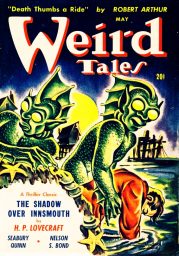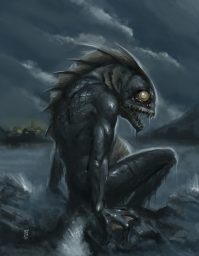The 2016 H. P. Lovecraft Re-read: The Shadow Over Innsmouth
Sunday , 16, October 2016 Fiction 4 Comments Lovecraft followed up “At the Mountains of Madness” with “The Shadow Over Innsmouth.” He wrote the story in November 1931 with a few different drafts. The story is 27,026 words long, so it is a little longer than “The Whisperer in Darkness.”
Lovecraft followed up “At the Mountains of Madness” with “The Shadow Over Innsmouth.” He wrote the story in November 1931 with a few different drafts. The story is 27,026 words long, so it is a little longer than “The Whisperer in Darkness.”
Lovecraft wrote a story not about cosmic entities from other dimensions this time. “The Shadow Over Innsmouth” has a young man from Ohio traveling through New England for reasons of “sightseeing, antiquarian, and genealogical.” Short on funds, he decides to take the bus from Newburyport, MA through Innsmouth to Arkham.
The people in Newburyport have no use for Innsmouth nor its inhabitants. The bus driver is described as “He had a narrow head, bulging, watery blue eyes that never seemed to wink, a flat nose, a receding forehead and chin, and singularly undeveloped ears. His long, thick lip and course-pored, grayish cheeks seemed almost beardless except for some sparse yellow hairs that straggled and curled in irregular patches; and in places the surface seemed queerly irregular, as if peeling from some cutaneous diseas.”
The decay of the town of Innsmouth is described in detail with sagging gambrel roofs, leaning telegraph poles with no wires, grass grown railroad tracks, a sand clogged harbor, rotten wharves etc. The people are “simian looking” and “repellant.”
Through an outsider working at a grocery store, the narrator finds out about nonagenarian Zadok Allen. Allen knows about the history of the town.
Allen is found and plied with alcohol. This is one problem with the story. The narrator does not want to buy a train ticket due to cost but blows a bunch of money buying a quart of bootleg whiskey “not cheaply obtained.”
Old Zadok opens up telling the tale of Captain Obediah Marsh who traded in the South Seas. Marsh had become friendly with natives of one island who had contact with “frog-fish monsters.” He brings back a Kanaka wife and a new cult replete with human sacrifices. In the year 1846, Marsh launches a coup with hordes of fish-men coming into town and killing about half the population. The cross-breeding of human and the fish-men began then.
Chapter Four has the narrator stuck in Innsmouth due to engine malfunction. He has to stay overnight at the only hotel, the rundown Gilman House. Given a room with no dead bolts on the door, our narrator finds one on the clothes press and transfers it to the vacant space with a 1920s version of a leatherman tool.
There are furtive steps and voices in the hallway and an attempted break in. The narrator was ready and batters his way through some doors to adjoining rooms. Making a makeshift rope out of drapes, he makes his escape to the neighboring building.
A crowd of the Innsmouth men are in pursuit. They are described as hopping and croaking, “their heads were the heads of fish.” Lovecraft also describes them as “fish-frogs.”
At some point, you are waiting for the narrator to pull out a Colt M1911 .45 ACP pistol in one hand and a trench knife-knuckle duster in the other. That does not happen and the  ichor does not flow. That would not be H. P. Lovecraft. The narrator makes his escape collapsing in a faint after the last close call.
ichor does not flow. That would not be H. P. Lovecraft. The narrator makes his escape collapsing in a faint after the last close call.
Looks like the narrator was targeted for human sacrifice.
The last chapter (V) goes into his genealogy that turns out to be from Innsmouth. There are descriptions of dreams of the undersea cities of the Deep Ones. Cthulhu is mentioned as also a shoggoth. He is turning into a Deep One himself and will join his relatives “amidst wonder and glory forever.”
This was the first Lovecraft story that I ever read. I did not have an easy time with it and it did not make me a Lovecraft fan. Having re-read “At the Mountains of Madness” last week, “The Shadow Over Innsmouth” comes off much tighter in execution.
Unfortunately for Lovecraft, the length of the story combined with a five chapter story worked against its sale. Lovecraft himself was dissatisfied with the result. Farnsworth Wright rejected it when August Derleth submitted the story. A cut version did eventually appear in Weird Tales in the January 1942 issue. The Canadian edition of the magazine contained it in the May 1942 issue with a great cover. I may be wrong but this is the only time Lovecraft ever snagged the cover story for Weird Tales.
Lovecraft had come up with one of his greatest creations, the Deep Ones. “The Shadow Over Innsmouth” had an influence on other writers. Most of August Derleth’s Mythos stories from the 1940s have Deep Ones. In Derleth’s stories, he changes the appearance from fish-men to toad-men. That is probably where Karl Edward Wagner got his Batrachians in Bloodstone.
There have been theories on the genesis of “The Shadow Over Innsmouth.” Will Murray has written that Lovecraft may have had the new pulp magazine Strange Tales in mind for the story. Russell E. Burke (A Short Biography of Robert E. Howard) said to me that he thinks it was Lovecraft’s attempt to write a Robert E. Howard type story.
The Deep Ones really have not been used in sword and sorcery fiction surprisingly. There is an episode of Jonny Quest, “The Sea Haunt” that has a creature suspiciously like a Deep One. One wonders if the writer had read “The Shadow Over Innsmouth.”
Lovecraft may have meant for the story to be a warning on what he perceived the dangers of miscegenation and unrestricted immigration. Decay and degeneration are just around the corner once that happens.
Good analysis. And that’s a valid criticism about the protag’s over-generous use of money he was supposed to be conserving.
You’re probably right about Lovecraft’s intent to write a warning about miscegenation. Sam Francis admired HPL for just that reason.
Question: I’m trying to recall a Howard story that Shadow emulates. Can you name some examples?
-
Robert E. Howard’s “The Shadow Kingdom” has a claustrophobic paranoia present. Kull is rather passive in the face of it all. It is Brule who leads him to the fight and the ichor flies!
Shadow over Innsmouth was the first Lovecraft story I read, and that was over 40 years ago when I was 14. Your analysis is quite good, though I disagree with you about the money issue. When the narrator says the bootleg booze was “not cheaply obtained,” I question Lovecraft’s intent in choosing the word “cheaply.” Over the years, the word has been progressively impoverished; whereas one could once use it as a synonym for ‘decrepit’ or even ‘difficult,’ now it means only ‘at little monetary cost.’
It brings to mind Thomas Paine’s great words about the value of Liberty: “What we obtain too cheaply, we esteem too lightly.” In this sense, ‘cheap’ means ‘with little effort.’
If we look at the narrator’s declaration that the whiskey was not cheaply obtained, then, I think it’s more than plausible that Lovecraft was not referring to his evaluation of monetary value but to the relative difficulty he had in finding any alcohol at all in the blighted and shuttered village of Innsmouth.
-
Good point, though I believe that in this case the word “cheaply” is used in the common sense. The sentence in question goes: “A quart bottle of whiskey was easily, though not cheaply, obtained in the rear of a dingy variety-store just off the Square in Eliot Street.” This rules off the possibility you mentioned.
Anyway, I don’t think that a contradiction like this (that the protagonist finds a train ticket from Newburyport too expensive, but buys a Innsmouth drunk a costly bottle of whiskey) means that Lovecraft “made a mistake” in the story. At this point, the protagonist seems to be determined to learn the secret of Innsmouth – financial matters probably come second.